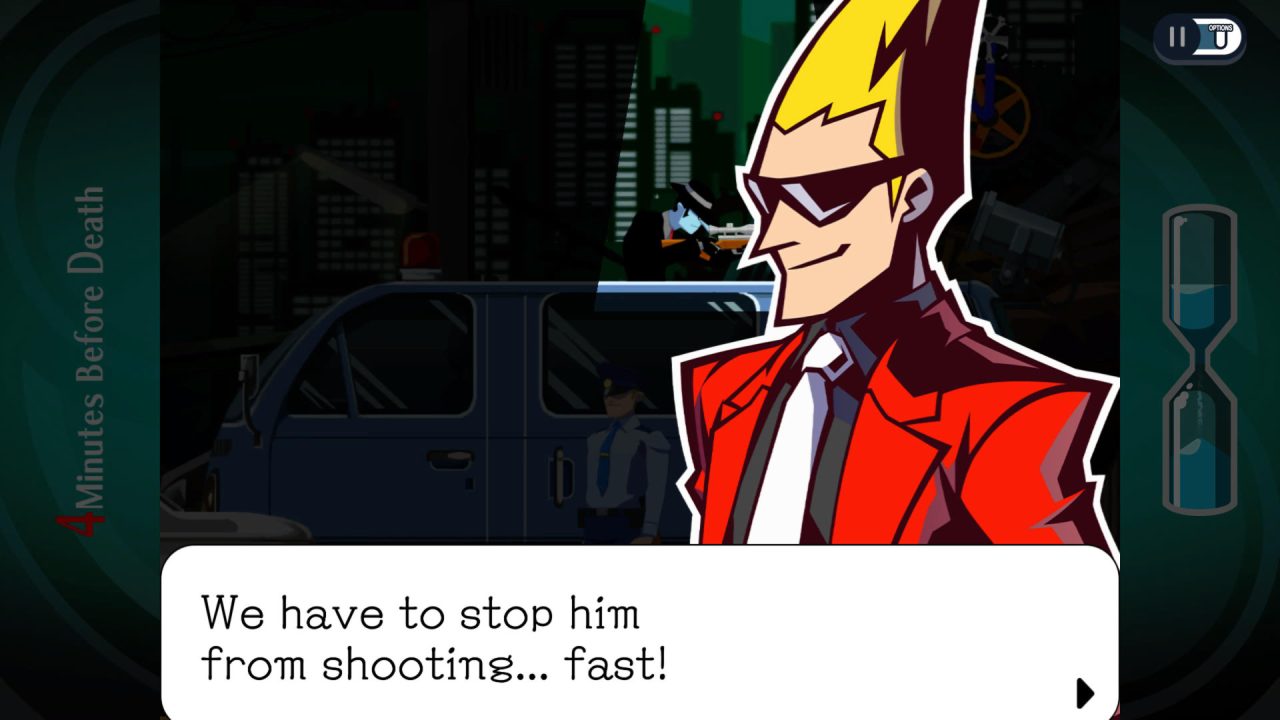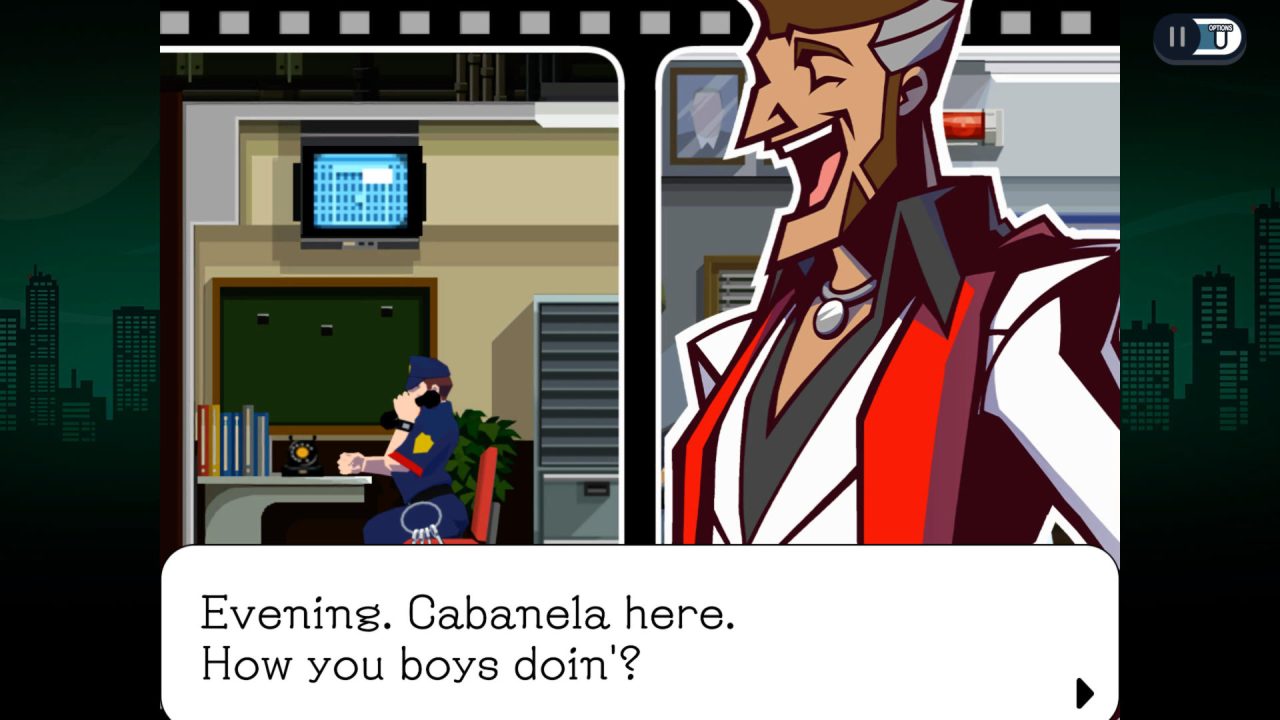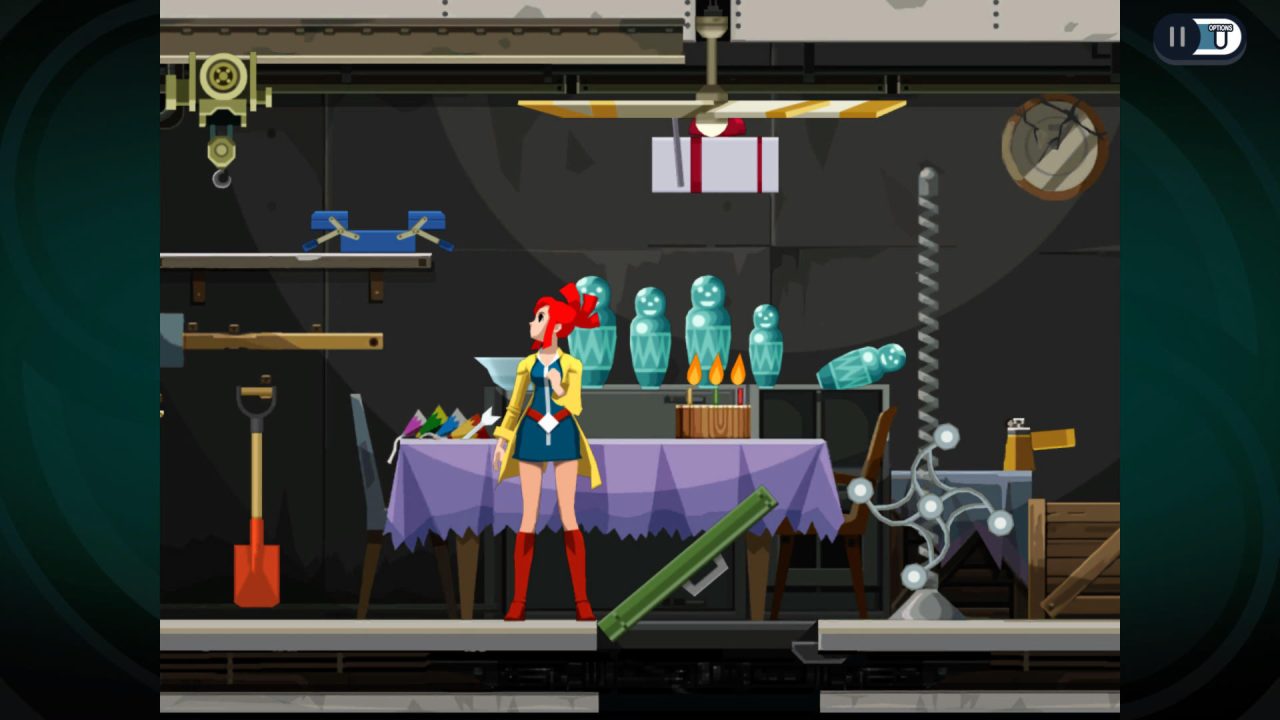When it comes to great hardware, it’s tough to beat the Nintendo DS. Not only did the handheld go gangbusters (150+ million units to date), but it did so while boasting a truly eclectic library. From Brain Age to Professor Layton, Rhythm Heaven to Phoenix Wright, many of the DS’s quirkiest titles were also its best. Capcom’s Ghost Trick: Phantom Detective may not have the same brand value as the above titles, but it certainly has the same spirit. The 2011 mystery-adventure developed a small following thanks to its inventive puzzles, charming characters, and gasp-worthy twists. Sadly, lackluster sales on DS combined with an overlooked iOS port dulled any reasonable hope for a sequel.
And yet, hope springs eternal. After more than a decade, Ghost Trick: Phantom Detective is back with a remaster for modern platforms. For fans of the original release, this is an opportunity to relive the mystery of Sissel and Lynne, while for newcomers, it’s a chance to experience a cult classic for the very first time.
Regardless of which camp you belong to, you’re in for a treat. Ghost Trick: Phantom Detective remains a captivating caper, supported by strong puzzles, sharp writing, and updated visuals and music. That said, the game does suffer the occasional stumble. Some puzzles are duds, and the narrative bites off more than it can chew, especially toward the end. But the overall package impresses, especially for those who’ve been itching to see what all the fuss is about.

Ghost Trick: Phantom Detective stars Sissel, a man-turned-spirit who awakens in a city junkyard at 7:02 PM to some grizzly news: He’s been murdered, and he has no recollection of who he was or why his murder occurred. After encountering a fellow spirit named Ray, Sissel comes to grips with his new reality and vows to unravel the mystery behind his death. Easier said than done, of course. Sissel can no longer manipulate his body, so discovering the details of his death presents a challenge. Making matters worse, his only lead — a woman named Lynne — is being hunted by a league of assassins. Throw in the fact that Sissel’s essence will disappear by sunrise, and the odds are certainly stacked against him.
Despite his immobility, Sissel isn’t totally down for the count. As a spirit, he has access to otherworldly abilities known as “ghost tricks.” These tricks allow him to possess inanimate objects and manipulate them in subtle ways. Inhabit a tire, and you’ll roll his spirit forward. Take control of a fridge, and you pop its door open, granting access to a new vantage point. Find a phone, and you can trace the person on the other line, letting you travel to their location.
These mechanics set the stage for Ghost Trick’s core gameplay hook. Across 18 chapters, you hop between different levels — from an apartment complex to a chicken restaurant — to investigate leads and thwart future attempts on Lynne’s life. Along the way, you meet a cast of oddball characters. There’s Cabanela, a flamboyant detective with a passion for dancing; Jeego, a hitman with terrible eyesight; Emma, a gaudy aristocrat who’s writing an erotic romance novel; and, of course, there’s Missile, an adorable Pomeranian pup who becomes an essential companion.

Ghost Trick: Phantom Detective doesn’t shy away from its eccentricities. Its characters drip with personality, boasting expressive wardrobes and exaggerated animations. Dialogue boxes pop, both visually and sonically. Even the game’s music carries a certain swagger, whether it’s a bluesy ballad or an upbeat groove. If you’ve played an Ace Attorney game before, this may sound like a familiar formula — and that’s no accident. Both Ghost Trick and Ace Attorney share the same creative director, Shu Takumi, as well as the same composer, Yasumasa Kitagawa.
Ghost Trick always had a distinct style, but the game absolutely glows on modern hardware. The remaster sports completely overhauled visuals. Character models look crisp and clean, and environments pop with color; even the text is easy on the eyes. Meanwhile, Kitagawa returns with an updated take on his already-beloved soundtrack. If you have a soft spot for the original soundtrack, you’ll be pleased to hear that you can toggle between the two at will.
Ace Attorney and Ghost Trick may share some DNA, but the two are decidedly different series. Unlike the Ace Attorney games, where you collect evidence, interrogate witnesses, and attend trials, Ghost Trick’s mystery plays out through elaborate puzzles. In each chapter, you’ll use Sissel’s ghost tricks to prevent a murder. If you’re late to the crime, Sissel can revisit the victim’s death four minutes beforehand to alter their fate. In the intro level, you witness Lynne’s death by a shotgun blast, then have the opportunity to save her using items strewn about the junkyard. Later, when a gunman confronts Lynne’s friend Kamila, you help her hide from her assailant by manipulating everything from a pair of headphones to a Christmas tree. While I won’t spoil specifics, each chapter brings a novel challenge that requires everything from your recall to your reflexes.

While most puzzles in Ghost Trick: Phantom Detective deliver the goods, some fall flat. Two particular chapters irked me: one an unwieldy stealth section, the other a convoluted sting operation with an unintuitive solution. While both scenarios have intriguing premises, they’re a chore to actually play. Unlike other levels, which offer a generous stream of hints to nudge players along, these two rely heavily on trial and error for players to progress. These moments stray from what’s otherwise a challenging yet fair campaign.
Thankfully, those moments are rare, and I enjoyed most of my time with Sissel. Puzzles have a gratifying, butterfly effect feel, as even the smallest dominoes can lead to massive payoffs. These Rube Goldberg-like moments don’t just serve a gameplay purpose; they also extend to Ghost Trick’s mind-bender of a narrative. With each passing level, the time ticks from the evening into the wee hours of the morning. As Sissel alters the fate of the people around him, he learns more about his past. What begins as a supernatural murder mystery soon escalates into a full-blown tale of espionage and political intrigue.
There’s a lot to process in Ghost Trick’s 10- to 12-hour campaign. The game’s 18 chapters serve as self-contained episodes, each with its own narrative payoff, usually in the form of a shocking twist. Each time I thought I was getting closer to solving Sissel’s case, a timely revelation deepened the intrigue. Like any good mystery, every narrative thread and character motivation serves a purpose. You won’t find errant red herrings here. The episodic nature makes it easy to pick up and play, but when the story’s this good, it’s hard to put it down.

If there’s one place where the Ghost Trick’s story stumbles, it’s with the ending. The game lays it on a bit thick with its whodunnit explanation, expecting players to suspend their belief after a certain point and just “roll with it.” Without divulging key details, the narrative tells a twist or two too many, prioritizing the grandeur of its plot over the charm of its cast. I would have much preferred a simpler, more focused ending. Thankfully, the overall narrative offers more than enough thrills to make this a compelling play.
If you’ve already played Ghost Trick: Phantom Detective, you may wonder what else is new here. Aside from the enhanced visuals and soundtrack, the Ghost Trick remaster sticks largely to the source material. Despite being an HD remaster, the game keeps its 4:3 aspect ratio found on DS, save for the occasional animation or menu screen. While I imagine the developers made this choice to preserve the original experience, I would have loved to see the world of Ghost Trick through a 16:9 lens. There are some other goodies as well — illustrations, a music player, etc. — but if you’re expecting all-new content, the remaster may disappoint.
For many, Ghost Trick: Phantom Detective is a chance to experience a game (and franchise) that was tragically shortlived. The DS original has made an effortless transition to modern consoles, and the core experience is every bit as good as it was 12 years ago. Not all puzzles carry their weight, and the game doesn’t exactly stick the landing, but you’d be hard-pressed to find a mystery with the wry wit and subtle charms of Ghost Trick. If you’re a mystery buff, don’t miss this caper.


